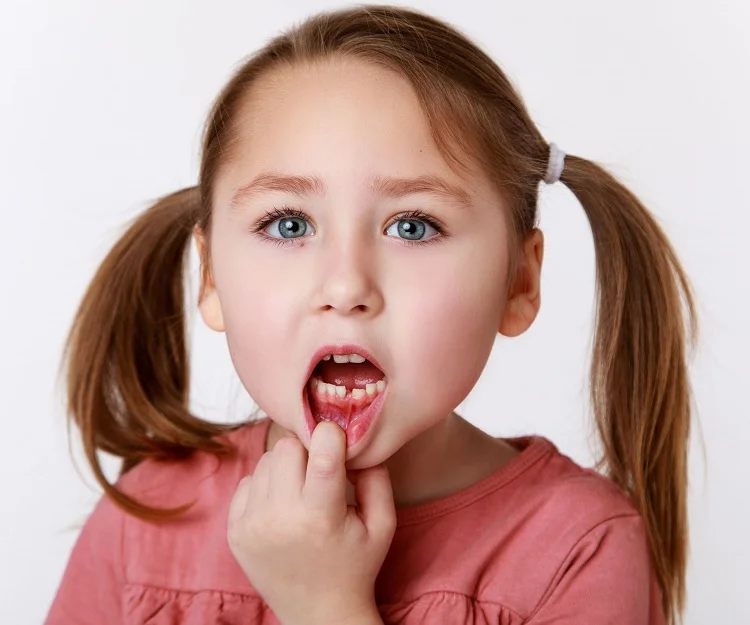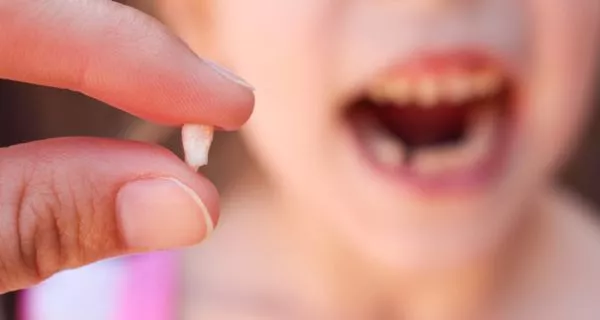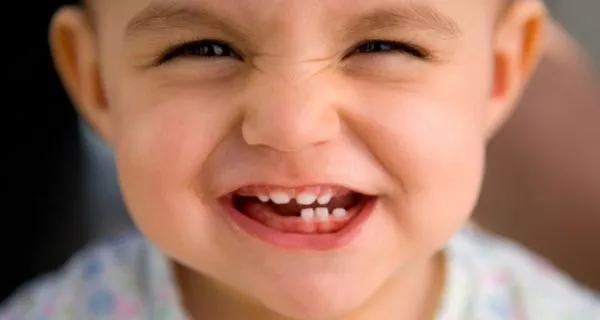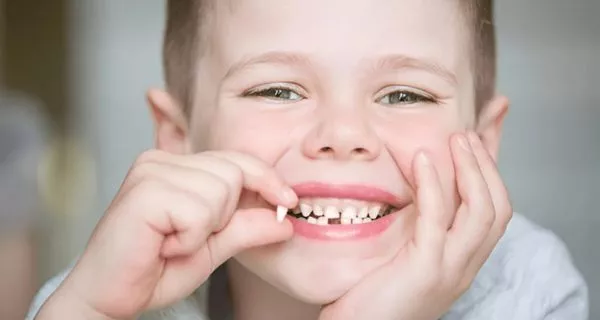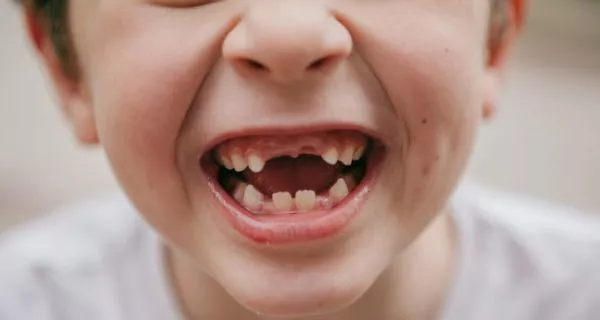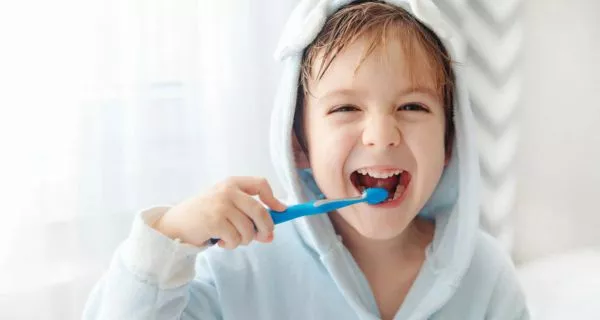Last Updated on: 2nd January 2026, 09:23 am
When your child loses their first tooth, stay calm and reassure them. It’s a natural process that usually happens between 5 and 6 years old. Keep their mouth clean, help with gentle brushing and flossing, and visit a dentist if the tooth falls out too early, causes pain, or bleeds excessively. Make it fun with the Tooth Fairy or a small keepsake box!
Losing the first tooth is an exciting milestone, just like the first word or first steps. For many children, it’s a moment they’ll remember forever.
When a child has their first loose tooth, everything focuses on that tooth; the excitement and anxiety about this new change make it a very special time.
However, many questions may come up, especially for first-time parents. This guide will help you understand what to do when your child loses a tooth, how to care for them and make the experience fun and safe.
Why do baby teeth fall out?
Humans have two sets of teeth:
- Baby teeth (temporary teeth): 20 in total, meant to stay in the mouth during childhood. They guide the growth of the jaw and save space for permanent teeth.
- Permanent teeth: 32 in total (including wisdom teeth), designed to last a lifetime.
As your child’s mouth grows, baby teeth naturally fall out, making room for permanent teeth. This is a gradual and natural process.
How do baby teeth fall out?
All teeth have two main parts: the crown (the part you see) and the root (the part inside the bone that holds the tooth).
This process happens like this:
- As the child grows, the permanent tooth forms under the baby tooth.
- As the permanent tooth grows, it absorbs minerals from the root of the baby tooth.
- When it is time to come out, the permanent tooth pushes up.
- Slowly, the root dissolves and gets shorter. The tooth becomes loose and can move a little.
- Eventually, the baby tooth falls out naturally, leaving space for the permanent tooth.
This ensures permanent teeth have enough room to grow correctly.
Why does taking care of baby teeth matter?
Many parents think baby teeth are not important because they fall out. This is not true. Baby teeth are as important as permanent teeth.
Here are 6 reasons why you should take care of your child’s baby teeth:
- Save space for permanent teeth: Baby teeth act as placeholders, guiding permanent teeth into the correct position.
- Support speech development: Missing teeth can affect pronunciation and confidence in speaking.
- Prevent infections: Cavities in baby teeth can spread infection, damage permanent teeth, and rarely affect overall health.
- Guide jaw growth: Healthy baby teeth ensure proper jawbone development; early loss can disrupt facial growth.
- Chewing and nutrition: Early loss can make eating difficult and impact nutrition.
- Appearance and social confidence: Losing teeth too early or having decayed teeth can affect self-esteem.
Baby teeth are not “just temporary.” They are vital for your child’s dental health, development, and overall well-being. Caring for them early sets the stage for a lifetime of healthy teeth and confident smiles.
At what age do baby teeth fall out?
Most children lose their first tooth between 5 and 6 years old, but every child is different. Some may start losing teeth as early as 4 or as late as 7.
What if a tooth falls out too early?
If a baby tooth is lost prematurely due to cavities, injury, or other reasons, it’s important to protect the space for the permanent tooth:
- The dentist may use a space maintainer, a small device that keeps the spot open and prevents neighboring teeth from shifting.
- Each baby tooth matters until it’s replaced because it helps your child chew, guides permanent teeth into place, and protects them while they form.
What if teeth don’t fall out on time?
It’s normal for some children to lose teeth earlier or later than average.
- Regular dental check-ups are important to monitor tooth growth.
- If needed, the dentist may take an X-ray to ensure that the permanent teeth are forming correctly and nothing is blocking them.
What if my child doesn’t follow the typical timeline?
The ages mentioned are general guidelines. Children who were slow to get their first teeth may also lose them later.
However, if your child misses dental milestones by a year, either in eruption or shedding, consult your dentist for advice.
Which baby tooth falls out first?
The first teeth to fall out are the front teeth, lower first, then upper.
- By around 9 years old, most children have lost their front teeth.
- From 9 to 12 years old, the canines and molars are replaced.
After this, the child, now entering adolescence, has most permanent teeth, except wisdom teeth, which come later.
Which permanent tooth comes first?
Many think the first permanent tooth is the one replacing the first baby tooth. It seems logical, but it is not true.
- While the first baby teeth fall out (5–6 years), the first permanent molars grow in the back of the mouth.
- These molars are big and important for chewing and biting.
- Parents often do not notice them because they do not replace baby teeth.
Because they appear early and are easy to miss, these molars are more prone to cavities and dental problems in children.
What to do when a tooth falls out?
Losing a baby tooth is a natural process and usually not a problem. The tooth loosens when the permanent tooth is ready to come in, so it often falls out with little to no pain. Still, it can be a moment of worry, especially for children.
Here are some tips to help them feel calm and comfortable:
- Calm the child: Explain that losing teeth is normal and happens to all children. Reassure them that it is part of growing up.
- Control light bleeding
- Rinse the mouth with water and bite a damp cotton pad.
- If bleeding continues after 30 minutes, see a dentist.
- Reduce discomfort
- Apply a cold pack to the cheek near the lost tooth.
- Let the child enjoy a cold treat, like a water lollipop, to soothe the area and help the blood clot.
- Handle pain if it appears: Most children feel more discomfort than real pain, but if needed:
- Continue cold application to the area.
- Give over-the-counter pain medicine such as acetaminophen, following the pediatrician’s instructions.
- Make it fun: Traditions like the Tooth Fairy can help children see tooth loss as exciting rather than scary.
- Keep the tooth: Small boxes or containers can turn lost teeth into special keepsakes and fun memories with parents.
Encourage gentle brushing and a soft diet for a day or two after a tooth falls out. This keeps the area clean and prevents discomfort.
How to care for the new permanent tooth?
When a permanent tooth comes in, it is more vulnerable to cavities, so it’s important to reinforce good oral hygiene and develop healthy habits.
How to brush my child’s teeth correctly?
- Brush teeth at least twice a day, especially at night and after meals.
- Use a small amount of fluoride toothpaste (rice-sized for under 6 years, pea-sized from 6 years).
- Supervise brushing to ensure proper technique and prevent swallowing toothpaste.
- Make brushing fun with:
- soft, small-head children’s toothbrushes
- age-appropriate fluoride toothpaste with nice flavors
- electric children’s toothbrushes with timers or lights
How to use dental floss correctly?
Help your child clean between teeth with floss, especially when teeth are touching.
You can use:
- child-friendly flossers with colorful or fun handles
- soft or flavored floss (mint or fruit)
How to care for permanent molars?
From 6 years old, the back teeth are permanent. Brush and floss all the way to the back.
To avoid cavities:
- Use narrow or interdental brushes for molars.
- Go to the dentist for dental sealants to protect grooves and pits.
How often should I take my child to the dentist?
Take your child to the dentist from the first year of life or when the first baby tooth comes out. The dentist will follow their dental development.
When tooth replacement starts, visit every 6 months for:
- preventive cleaning
- fluoride and sealants
- early detection of any problems
Why is it important to care for teeth from a young age?
Losing the first tooth is a natural and exciting moment that marks a key stage in dental development.
Caring for both baby and permanent teeth ensures proper chewing, speech development, and healthy smiles for life.
Following guidance on what to do when your child loses a tooth helps make the process safe, comfortable, and even fun.
Frequently Asked Questions
How can I help my child lose a tooth?
What happens if my child loses a tooth?
What to do if a baby tooth falls out?
How to manage the pain after the loss of a tooth?
Why take care of milk teeth?
Voice and Search (Q&A)
Which baby teeth fall out first?
The lower front teeth usually fall out first, followed by the upper front teeth.
What if the tooth is bleeding a little?
Light bleeding is normal. Have your child bite on a clean cotton pad for 20–30 minutes, it will stop soon.
Is it important to keep baby teeth healthy?
Yes! Baby teeth save space, help with chewing, and guide permanent teeth. Healthy teeth make growing easier.
Share
References
1. JADA. (2005). Tooth eruption. The Journal of the American Dental Association, 136(11), 1619. https://doi.org/10.14219/jada.archive.2005.0095
2. Cleveland Clinic. (2023, August 28). What to do when you knock out a tooth. Cleveland Clinic. https://health.clevelandclinic.org/must-act-fast-tooth-gets-knocked
3. Lewsley, J. (2022, February 28). Everything to know about when a child loses their first tooth. https://www.medicalnewstoday.com/articles/when-do-kids-lose-their-first-tooth
4. Murshid, S. A., Al-Labani, M. A., Aldhorae, K. A., & Rodis, O. M. M. (2016). Prevalence of prematurely lost primary teeth in 5-10-year-old children in Thamar city, Yemen: A cross-sectional study. Journal of International Society of Preventive and Community Dentistry, 6(8), 126. https://doi.org/10.4103/2231-0762.189739
5. Smith, G. D. (2020, March 31). When do baby teeth fall out and adult teeth come in? Healthline. https://www.healthline.com/health/childrens-health/baby-teeth-fall-out
-
Dr. Yeidy Carolina Mesa [Author]
DDS Yeidy Carolina Mesa Passionate Dentist | Advocate for Accessible Oral Health Education Graduating from Universidad CES in 2022, I am a dedicated general dentist with a lifelong passion for helping others and making a meaningful impact in the world. My journey into dentistry began at the age of 7, inspired by my own experience with braces and overcoming a fear of the dentist. This personal journey shaped my mission to help patients conquer their own dental anxieties and embrace a healthier,...
View all posts
-
Nayibe Cubillos M. [Medical Reviewer]
Pharmaceutical Chemestry |Pharmaceutical Process Management | Pharmaceutical Care | Pharmaceutical Services Audit | Pharmaceutical Services Process Consulting | Content Project Manager | SEO Knowledge | Content Writer | Leadership | Scrum Master
View all posts
A healthcare writer with a solid background in pharmaceutical chemistry and a thorough understanding of Colombian regulatory processes and comprehensive sector management, she has significant experience coordinating and leading multidisciplina...


